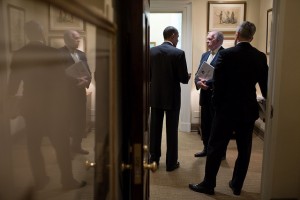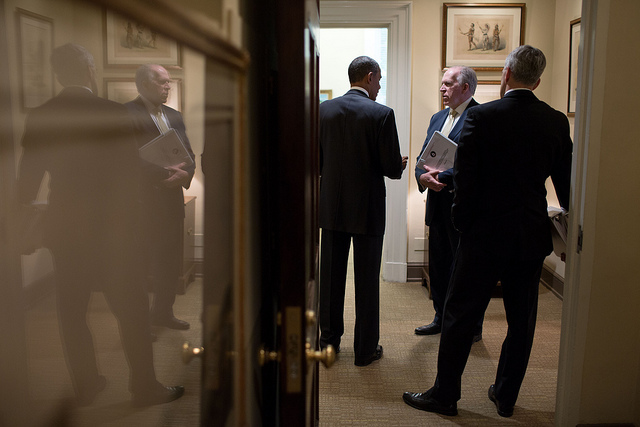Under Clapper’s Continuous Monitoring CIA Could Continuously Monitor SSCI on CIA Network
As I pointed out the other day, the CIA IG Report on spying on the Senate Intelligence Committee appears to say the egregious spying happened after John Brennan told Dianne Feinstein and Saxby Chambliss on January 15 CIA had been spying on SSCI.
Agency Access to Files on the SSCI RDINet:
Five Agency employees, two attorneys and three information technology (IT) staff members, improperly accessed or caused access to the SSCI Majority staff shared drives on the RDINet.
Agency Crimes Report on Alleged Misconduct by SSCI Staff:
The Agency filed a crimes report with the DOJ, as required by Executive Order 12333 and the 1995 Crimes Reporting Memorandum between the DOJ and the Intelligence Community, reporting that SSCI staff members may have improperly accessed Agency information on the RDINet. However, the factual basis for the referral was not supported, as the author of the referral had been provided inaccurate information on which the letter was based. After review, the DOJ declined to open a criminal investigation of the matter alleged in the crimes report.
Office of Security Review of SSCI Staff Activity:
Subsequent to directive by the D/CIA to halt the Agency review of SSCI staff access to the RDINet, and unaware of the D/CIA’s direction, the Office of Security conducted a limited investigation of SSCI activities on the RDINet. That effort included a keyword search of all and a review of some of the emails of SSCI Majority staff members on the RDINet system.
With that in mind, consider this passage of James Clapper’s July 25, 2014 response to Chuck Grassley and Ron Wyden’s concerns about Clapper’s new ongoing spying on clearance holders.
With respect to your second question about monitoring of Members of Congress and Legislative Branch employees, in general those individuals will not be subject to [User Activity Monitoring] because their classified networks are not included in the definition of national security systems (NSS) for which monitoring is required.
[snip]
Because no internally owned or operated Legislative branch network qualifies as a national security system, UAM by the Executive Branch is accordingly neither required nor conducted. To be clear, however, when Legislative Branch personnel access a national security system used or operated by the Executive Branch, they are of course subject to UAM on that particular system.
CIA’s spying on SSCI took place on CIA’s RDI network, not on the SSCI one. SSCI had originally demanded they be given the documents pertaining to the torture program, but ultimately Leon Panetta required them to work on a CIA network, as Dianne Feinstein explained earlier this year.
The committee’s preference was for the CIA to turn over all responsive documents to the committee’s office, as had been done in previous committee investigations.
Director Panetta proposed an alternative arrangement: to provide literally millions of pages of operational cables, internal emails, memos, and other documents pursuant to the committee’s document requests at a secure location in Northern Virginia. We agreed, but insisted on several conditions and protections to ensure the integrity of this congressional investigation.
Per an exchange of letters in 2009, then-Vice Chairman Bond, then-Director Panetta, and I agreed in an exchange of letters that the CIA was to provide a “stand-alone computer system” with a “network drive” “segregated from CIA networks” for the committee that would only be accessed by information technology personnel at the CIA—who would “not be permitted to” “share information from the system with other [CIA] personnel, except as otherwise authorized by the committee.”
It was this computer network that, notwithstanding our agreement with Director Panetta, was searched by the CIA this past January,
Presumably, those limits on access should have prevented CIA’s IT guys from sharing information about what SSCI was doing on the network. But it’s not clear they would override Clapper’s UAM.
Remember, too, when Brennan first explained how this spying didn’t qualify as a violation of the Computer Fraud and Abuse Act, he said CIA could conduct “lawfully authorized … protective … activity” in the US. Presumably like UAM.
I have no idea whether this explains why CIA’s IG retracted what Feinstein said had been his own criminal referral or not. But I do wonder whether the CIA has self-excused some of its spying on SSCI in the interest of continuous user monitoring?
If so, it would be the height of irony, as UAM did not discover either Chelsea Manning’s or Edward Snowden’s leaks. Imagine if the only leakers the Intelligence Community ever found were their own overseers?


